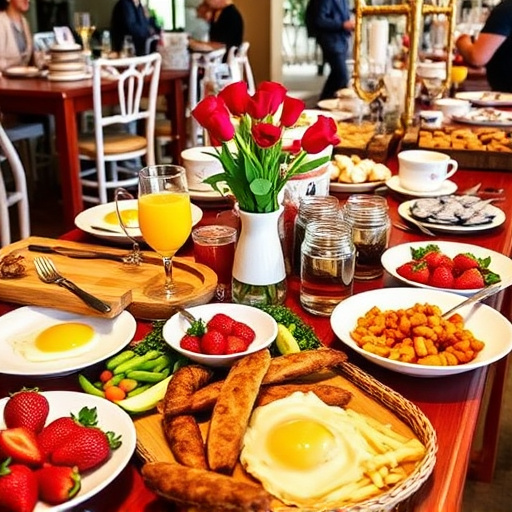Revolutionize Corporate Events: Flexible Catering Packages for Success
Corporate event catering is an art that goes beyond food service, focusing on aligning with event go…….
Corporate event catering is a strategic and specialized service that plays a pivotal role in the success of business gatherings, conferences, product launches, and other corporate events worldwide. It involves the art and science of planning, preparing, and serving food and beverages tailored to meet the unique needs of corporate clients. This article aims to provide an in-depth exploration of this dynamic industry, delving into its various facets, global impact, economic implications, technological innovations, regulatory landscape, challenges, and future prospects. By the end, readers will have a comprehensive understanding of why corporate event catering is not just about feeding attendees but also about creating memorable experiences that drive business results.
Definition: Corporate event catering is the process of designing and delivering food service for events organized by businesses or corporations. It encompasses everything from initial planning, menu creation, procurement of ingredients, on-site preparation, to serving and managing waste disposal.
Core Components:
Event Planning and Strategy: Involves understanding the client’s objectives, target audience, event theme, and budget. Caterers collaborate closely with event planners and organizers to ensure seamless execution.
Menu Design: Creating culinary concepts aligned with the event’s purpose, cultural considerations, dietary preferences, and branding. Menus can range from formal sit-down dinners to casual buffets or interactive food stations.
Logistics and Procurement: This includes securing venues, equipment rental, staffing, transportation of food and beverages, and ensuring adherence to health and safety regulations.
Food Preparation and Presentation: Caterers prepare and serve food using high-quality ingredients, adhering to specific recipes and presentation styles. They also ensure proper handling and storage during transit.
Historical Context: The roots of corporate event catering can be traced back to the 19th century when grand balls and formal gatherings became popular among businesses and social elites. Over time, as events evolved, catering services became more sophisticated, adapting to diverse cultural cuisines and dietary needs. Today, it has grown into a multi-billion-dollar industry, driven by the increasing globalisation of business and the need for memorable corporate experiences.
Significance: Corporate event catering is essential for several reasons:
Enhancing Brand Image: Well-executed events with exceptional food service can strengthen a company’s brand reputation and create positive associations.
Networking Opportunities: Social gatherings provide platforms for business networking, fostering relationships among colleagues, clients, and partners.
Employee Engagement: Events that prioritize employee satisfaction and recognition boost morale, productivity, and retention rates.
Customer Experience: Impressing clients and customers through memorable events can lead to stronger business relationships and increased sales.
Corporate event catering is a global phenomenon, with every region adopting its unique cultural influences while staying true to international trends. Here’s an overview:
| Region | Key Trends | Cultural Influences |
|---|---|---|
| North America | Personalized experiences, sustainable food choices, and interactive dining formats | Fusion cuisines, farm-to-table movements, and a focus on local ingredients |
| Europe | Health-conscious options, diverse cultural menus, and eco-friendly practices | Mediterranean diets, traditional European pastries, and a push for sustainability |
| Asia Pacific | Fusion cuisine blends, unique presentation styles, and wellness-focused menus | Diverse regional cuisines, tea ceremonies, and an emphasis on fresh, local produce |
| Middle East & Africa | Opulent presentations, exotic flavors, and cultural heritage showcases | Arabic, Moroccan, and South African culinary traditions |
Global Influence: The industry is shaped by global trends, such as the rise of experiential marketing, sustainability, and health-conscious living. International businesses often use events to showcase their global reach and diverse portfolios, leading to a demand for caterers who can deliver consistent quality across borders.
Regional Variations: Despite international influences, regional cuisines and cultural preferences remain powerful drivers. Caterers adapt their offerings to accommodate local tastes, dietary restrictions, and religious practices. For instance, Halal and Kosher food services are essential in the Middle East and Africa, respectively.
The global corporate event catering market is substantial and growing, driven by factors like rising disposable incomes, increasing corporate spending on events, and a focus on experiential marketing. According to a 2022 report by Grand View Research, the market size was valued at USD 145.8 billion in 2021 and is projected to expand at a CAGR of 7.5% from 2022 to 2030.
Corporate event catering attracts significant investments due to its potential for high returns. Businesses invest in events as a form of marketing, team-building, and customer loyalty building. Major corporations often have dedicated event management teams or outsource catering services to specialized companies.
Job Creation: The industry supports numerous jobs, ranging from chefs and server staff to event planners and logistics coordinators.
Local Economy Boost: Events caterers contribute to local economies by purchasing supplies, renting venues, and hiring local talent.
Tourism Promotion: Well-organized events can attract visitors, stimulate local tourism, and enhance a city’s reputation as a desirable business destination.
Technology has revolutionized corporate event catering, offering new opportunities for innovation and efficiency:
Online Menu Customization: Digital platforms allow clients to customize menus, select options, and provide dietary preferences, streamlining the planning process.
Real-Time Event Management: Caterers use mobile apps and software for inventory tracking, staff scheduling, and real-time communication during events, ensuring smooth operations.
Interactive Food Stations: Pop-up kitchens and interactive food bars create unique dining experiences, allowing guests to customize their dishes and engage with chefs.
Sustainable Practices: Technology aids in implementing eco-friendly initiatives, such as digital invitations, online ordering, and efficient energy management systems.
Data Analytics: Caterers can now analyze event data to gain insights into guest preferences, popular menu items, and successful event strategies, enabling them to refine their services.
The corporate event catering industry operates within a framework of laws and regulations that vary across jurisdictions:
Food Safety Standards: These ensure the safe handling, preparation, and serving of food, including requirements for food safety training, hygiene practices, and allergen labeling.
Health and Labor Laws: Caterers must adhere to labor regulations regarding minimum wage, overtime, and worker classification. They also need to comply with health department guidelines for facilities, equipment, and sanitation.
Licensing and Permits: Obtaining licenses and permits is essential for operating catering businesses, including food service licenses, event permitting, and alcohol serving permissions.
Environmental Regulations: These cover waste management, recycling, and sustainable practices, with some regions having strict guidelines for single-use plastics and food waste reduction.
Cultural and Religious Sensitivity: Caterers must be aware of cultural and religious dietary laws (e.g., Halal, Kosher, vegetarian, vegan) to accommodate diverse guest needs.
Despite its growth, the corporate event catering industry faces several challenges:
| Challenge | Description |
|---|---|
| Seasonality and Unpredictable Demand | Fluctuating economic conditions and unpredictable weather can impact event planning, affecting caterer bookings and revenue. |
| Competition and Cost Pressures | Intense competition among caterers puts pressure on pricing while expecting high-quality standards. |
| Logistical Complexity | Managing food transportation, setup, and serving during events in various locations presents significant logistical challenges. |
| Sustainability Concerns | Reducing environmental impact, minimizing waste, and adopting sustainable sourcing practices are ongoing challenges. |
| Changing Consumer Preferences | Keeping up with evolving dietary preferences, allergies, and health trends requires constant innovation and menu updates. |
Strategic Solutions:
Diversification: Caterers can expand their services to include diverse event types, locations, and budgets to mitigate seasonality risks.
Partnerships: Collaborating with venues, event planners, and local suppliers can optimize resources, reduce costs, and enhance service offerings.
Technology Integration: Utilizing technology for efficient inventory management, online ordering, and real-time communication improves operational effectiveness.
Sustainability Initiatives: Implementing eco-friendly practices, such as compostable packaging, local sourcing, and energy-efficient equipment, can attract environmentally conscious clients.
Menu Innovation: Staying abreast of food trends, offering customizable options, and catering to diverse dietary needs ensures caterers remain competitive.
A renowned New York City catering company, Green Plate, has made a name for itself by combining gourmet food with eco-friendly practices. They source locally produced ingredients, use compostable packaging, and offer vegetarian and vegan options tailored to each event’s theme. Their success lies in educating clients about the environmental impact of their choices while providing exceptional culinary experiences.
The tech hub of San Francisco has seen a rise in interactive catering for corporate innovation events. One successful caterer, Chef-It-Up, creates immersive dining experiences with pop-up kitchens and interactive food stations. Their client, a leading tech company, hosted an event where guests could design their own molecular gastronomy dishes, fostering collaboration and creativity among attendees.
When hosting international events in diverse cultural settings, catering services must be highly adaptable. In Dubai, the caterer, Global Gourmet, has excelled at creating culturally sensitive menus for clients from around the world. They offer traditional dishes from various countries while ensuring Halal and Kosher certifications. This attention to detail has made them a go-to choice for global businesses hosting events in the Middle East.
The corporate event catering industry is poised for continued growth, driven by emerging trends:
Experiential Marketing: The focus on creating immersive brand experiences will continue to shape catering services, encouraging caterers to offer unique, interactive food concepts.
Sustainability and Eco-Consciousness: As environmental awareness grows, sustainable practices will become the norm, with caterers adopting eco-friendly packaging, sourcing local produce, and minimizing waste.
Personalization and Customization: Event organizers will demand personalized catering experiences tailored to their brand identities, target audiences, and event themes.
Virtual and Hybrid Events: The rise of virtual and hybrid events due to the COVID-19 pandemic has opened new opportunities for caterers to provide food services in remote settings, potentially reshaping the industry’s business model.
Corporate event catering is a dynamic industry that continues to evolve with changing global trends, technological advancements, and evolving consumer preferences. It plays a crucial role in enhancing corporate events, fostering connections, and driving business success. By embracing innovation, sustainability, and cultural sensitivity, caterers can create memorable experiences that leave a lasting impression on guests and clients alike.
As the industry navigates future challenges and adapts to new opportunities, it will remain an integral part of the global event landscape, contributing to economic growth, cultural exchange, and successful business ventures.
Q1: How do I choose a catering service for my corporate event?
A1: Consider factors like menu offerings, past client testimonials, flexibility in customizing events, local reputation, and their ability to handle your budget and event size.
Q2: Can caterers accommodate special dietary requirements?
A2: Absolutely! Most professional caterers are experienced in accommodating various dietary needs, including gluten-free, vegetarian, vegan, Halal, Kosher, and more. They often provide customizable menu options to suit diverse preferences.
Q3: What is the most eco-friendly way to cater a corporate event?
A3: Choose caterers who prioritize sustainability by using local and seasonal produce, compostable packaging, energy-efficient equipment, and minimizing food waste. Also, opt for recycling and composting facilities if available at the event venue.
Q4: How can I ensure my event catering budget is well-managed?
A4: Create a detailed budget breakdown, communicate openly with caterers about pricing structures, and request itemized quotes. Be mindful of hidden costs like service charges, setup fees, and minimum spend requirements. Negotiate when possible, and consider the value added by the caterer’s services.
Q5: What are some unique ways to incorporate technology into corporate catering?
A5: Technology can enhance events through online menu customization, digital place settings, real-time event tracking apps, interactive food stations with QR codes, and data analytics for guest engagement insights.

Corporate event catering is an art that goes beyond food service, focusing on aligning with event go…….

In the competitive corporate event catering sector, success hinges on creating exceptional, tailored…….